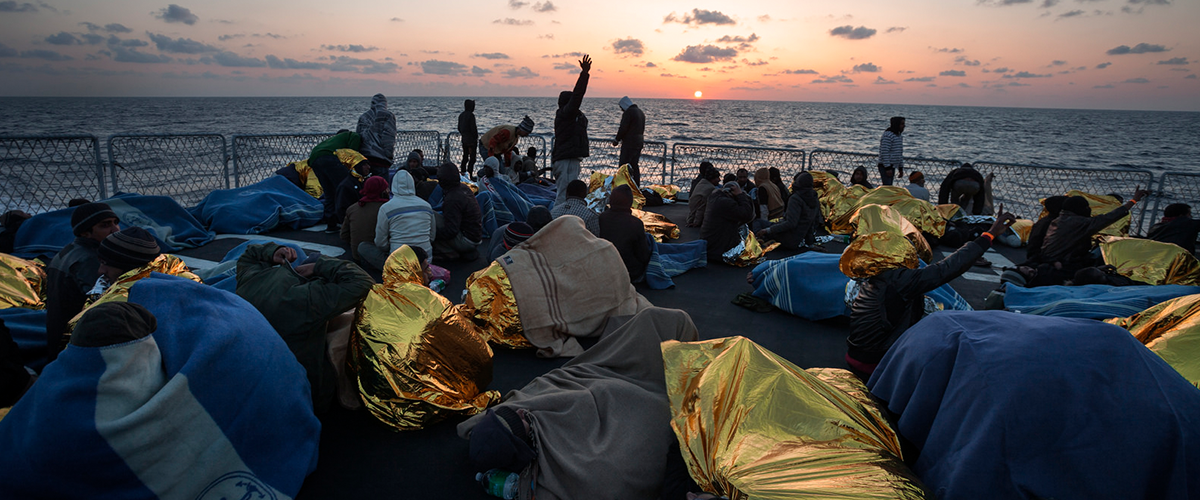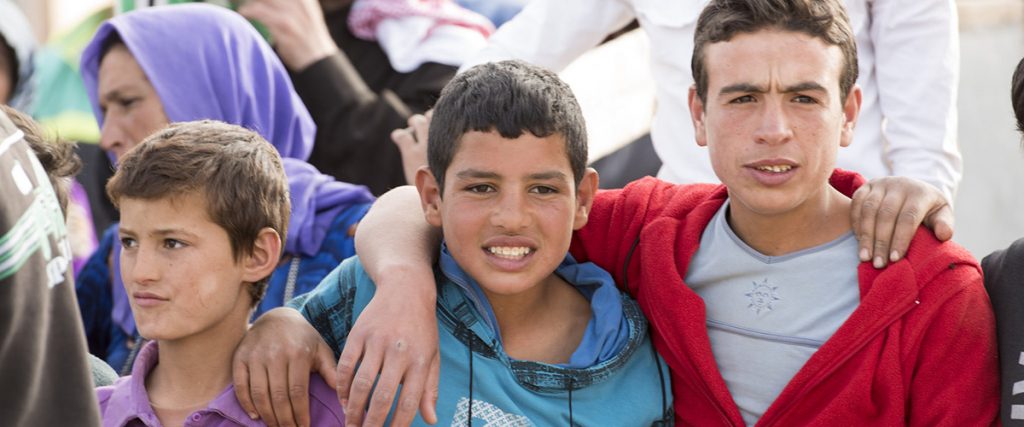
“I’ve met so many who have lost so much. But they never lose their dreams for their children or their desire to better our world. They ask for little in return – only our support in their time of greatest need” — UN Secretary-General, António Guterres
In a world where violence forces thousands of families to flee for their lives each day, the time is now to show that the global public stands with refugees.
To do this, the UN Refugee Agency launched the #WithRefugees petition in June 2016 to send a message to governments that they must work together and do their fair share for refugees.
On World Refugee Day, held every year on June 20th, we commemorate the strength, courage and perseverance of millions of refugees. This year, World Refugee Day also marks a key moment for the public to show support for families forced to flee.
Background
Every minute 20 people leave everything behind to escape war, persecution or terror.
There are several types of forcibly displaced persons:

Refugees
A refugee is someone who fled his or her home and country owing to “a well-founded fear of persecution because of his/her race, religion, nationality, membership in a particular social group, or political opinion”, according to the United Nations 1951 Refugee Convention. Many refugees are in exile to escape the effects of natural or human-made disasters.
Asylum seekers
Asylum seekers say they are refugees and have fled their homes as refugees do, but their claim to refugee status is not yet definitively evaluated in the country to which they fled.
Internally Displaced Persons
Internally Displaced Persons (IDPs) are people who have not crossed an international border but have moved to a different region than the one they call home within their own country.
Stateless Persons
Stateless persons do not have a recognized nationality and do not belong to any country.
Statelessness situations are usually caused by discrimination against certain groups. Their lack of identification — a citizenship certificate — can exclude them from access to important government services, including health care, education or employment.
Returnees
Returnees are former refugees who return to their own countries or regions of origin after time in exile. Returnees need continuous support and reintegration assistance to ensure that they can rebuild their lives at home.
UN Action
1951 Refugee Convention and its 1967 Protocol
Refugees are among the most vulnerable people in the world. The 1951 Refugee Convention and its 1967 Protocol help protect them. They are the only global legal instruments explicitly covering the most important aspects of a refugee’s life. According to their provisions, refugees deserve, as a minimum, the same standards of treatment enjoyed by other foreign nationals in a given country and, in many cases, the same treatment as nationals.
The 1951 Convention contains a number of rights and also highlights the obligations of refugees towards their host country. The cornerstone of the 1951 Convention is the principle of non-refoulement. According to this principle, a refugee should not be returned to a country where he or she faces serious threats to his or her life or freedom. This protection may not be claimed by refugees who are reasonably regarded as a danger to the security of the country, or having been convicted of a particularly serious crime, are considered a danger to the community.
The rights contained in the 1951 Convention include:
- The right not to be expelled, except under certain, strictly defined conditions;
- The right not to be punished for illegal entry into the territory of a contracting State;
- The right to work;
- The right to housing;
- The right to education;
- The right to public relief and assistance;
- The right to freedom of religion;
- The right to access the courts;
- The right to freedom of movement within the territory;
- The right to be issued identity and travel documents.
Some basic rights, including the right to be protected from refoulement, apply to all refugees. A refugee becomes entitled to other rights the longer they remain in the host country, which is based on the recognition that the longer they remain as refugees, the more rights they need.
Office of the United Nations High Commissioner for Refugees
The Office of the United Nations High Commissioner for Refugees (UNHCR), also known as the UN Refugee Agency, was established on 14 December 1950 by the United Nations General Assembly. The agency is mandated to lead and coordinate international action to protect refugees and resolve refugee problems worldwide. Its primary purpose is to safeguard the rights and well-being of refugees. It strives to ensure that everyone can exercise the right to seek asylum and find safe refuge in another State, with the option to return home voluntarily, integrate locally or to resettle in a third country. It also has a mandate to help stateless people.
UNHCR’s mandate distinguishes it from other humanitarian actors, requiring it to provide international protection to refugees who do not enjoy the protection of their governments. It also recognizes that international cooperation and support are needed to complement the efforts of the host country, which bears the primary responsibility for meeting the needs of refugees.
Rebuilding Lives in Peace and Dignity
UNHCR provides legal protection for refugees and seeks long-lasting solutions to their problems, by helping them either return voluntarily to their homes or settle in other countries. Its objective is to help refugees and other forcibly displaced persons rebuild their lives in peace and dignity.
The agency aims to uphold the rights of all displaced people, including women, children, older persons and people living with disabilities. Its seeks to reunite them with their families, protect them from sexual exploitation, abuse, violence and military recruitment, and offers education and training, health services, etc.
When there is a massive influx of refugees or internally displaced persons (IDPs) in a region, UNHCR can dispatch 300 skilled personnel in less than 72 hours following a crisis and leads the relief action to provide refugees and IDPs with emergency shelter — refugee camps, collective centres, makeshift shelters — and essential goods, including tents, blankets and plastic sheeting.
UNHCR also helps build clinics, schools and water wells for shelter inhabitants and gives them access to health care and psychosocial support during their exile. It coordinates family reunification activities and demobilization, disarmament and integration programmes for children associated with armed forces.
Repatriation and Integration
A refugee’s voluntary repatriation to her or his country or region of origin is considered the most successful outcome of all. Upon a refugee’s return home, UNHCR organizes “go-and-see” follow-up visits and provides safety information while engaging in community reconciliation activities and providing legal aid.
Refugees who cannot return home often locally integrate into host societies or resettle in a third country. In such cases, UNHCR supports integration programmes, such as cultural orientation, language and vocational training, and offers legal advice as well as psychological support to ensure that people are well integrated and resettled into societies in peace.
United Nations Relief and Works Agency for Palestine Refugees in the Near East (UNRWA)
Out of the estimated 15.2 million refugees in 2011, 4.8 million were Palestinian refugees registered with United Nations Relief and Works Agency for Palestine Refugees in the Near East (UNRWA).
The United Nations Relief and Works Agency for Palestine Refugees in the Near East provides assistance, protection and advocacy for registered Palestine refugees. UNRWA offers education, health care, relief and social services, camp infrastructure and improvement, community support, microfinance and emergency response, including in times of armed conflict.

